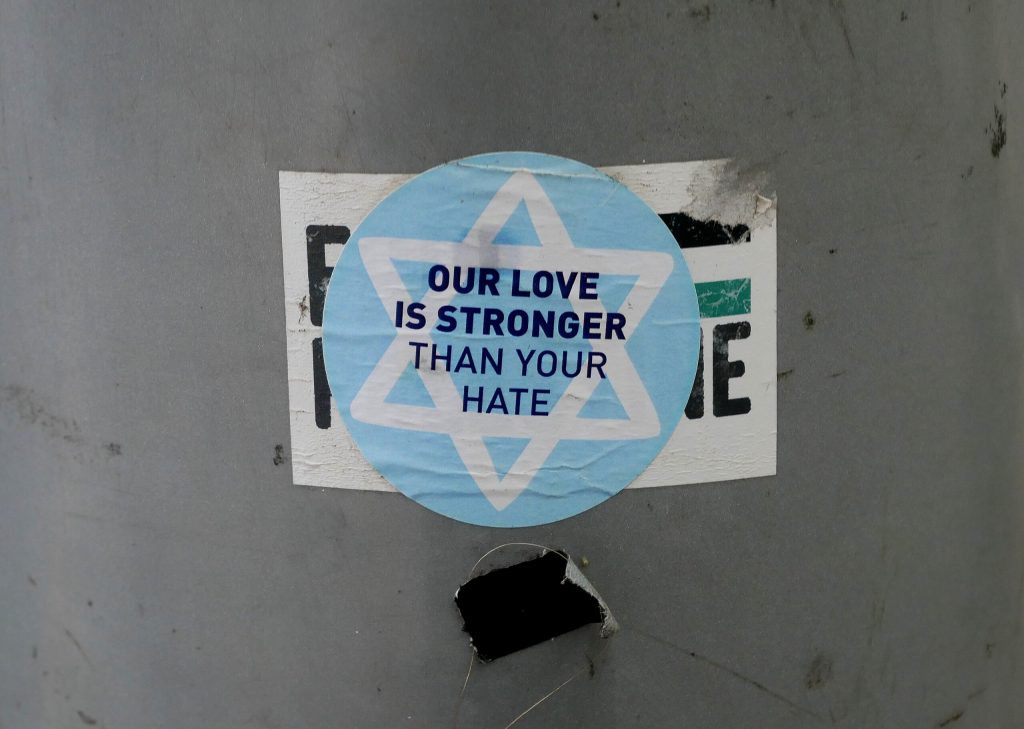Proposed Wisconsin Bill Adopts Official Definition of Antisemitism
Critics argue the definition could be used to target anti-Israel speech.

A sticker expressing opposition to anti-semitism. Photo by Doyle of London, (CC BY-SA 4.0), via Wikimedia Commons
Wisconsin state lawmakers are circulating a proposal to adopt an official definition of antisemitism, which advocates say could be part of fighting a documented increase in antisemitic incidents and attacks in recent years.
But the proposal comes as some entities, including leading universities, have adopted the definition as part of settlements with President Donald Trump’s administration. Critics worry it conflates criticism of Israel with antisemitism, and could be used as a cudgel against protected free speech.
As drafted, the bill would require that agencies and governmental units use the International Holocaust Remembrance Alliance working definition when investigating incidents to determine whether antisemitism was a motivating factor.
While officially adopted by the IHRA in 2016, the definition has been in use for about 20 years, according to Chad Goldberg, a sociologist and professor of Jewish studies at the University of Wisconsin-Madison. He said it’s a response to rising antisemitism in recent decades, with an additional increase since the war between Israel and Hamas after Hamas’ attacks on Oct. 7, 2023.
“It’s coming in a context of heightened concerns about antisemitism,” he said. “Proponents … think it would be a good idea because they think it would make it easier to identify and combat anti-Jewish hate speech and hate crimes, anti-Jewish harassment, vandalism and assault.”
The definition includes things like targeting Jewish people or organizations for violence or harassment, promoting conspiracy theories about Jewish people or denying the facts or existence of the Holocaust.
It also makes several references to anti-Israel behavior, including applying double standards to Israeli policies compared to that of other countries, holding Jews responsible for actions taken by the state of Israel, or denying “Jewish people their right to self-determination, e.g., by claiming that the existence of a State of Israel is a racist endeavor.”
The use of the definition would function as an add-on to other crimes, like vandalism or assault, according to the bill’s authors, who did not respond to WPR’s requests for an interview. It specifies that it cannot be used to target people’s First Amendment rights, or in conflict with other federal or state anti-discrimination laws.
“Adopting the definition of state law wouldn’t mean that breaching the IHRA definition is a crime in and of itself,” said Goldberg. “But the definition could be a useful tool to determine, if there is a criminal offense, whether there’s an antisemitic element to that offense.”
According to the Milwaukee Jewish Federation, more than 700 antisemitic incidents were reported in Wisconsin between 2015 and 2024. That included threats against Jewish households and a synagogue.
And since the Oct. 7 attacks on Israelis by Hamas militants, and Israel’s ongoing war in Gaza in response, the Jewish Federation has also tracked an increase in attacks on people who express support for Israel or Zionism, which is the ideology that Israel should exist as a self-determined Jewish homeland.
A debate over a debate — and free speech
Parsing the relationship between attacks on a protected religious or cultural identity, and expressing condemnation of a geopolitical entity — with which many Jewish people hold a personal relationship or identity — makes using the definition fraught, says Ken Stern.
Stern directs the Center for the Study of Hate at Bard College, and is the author of the book “The Conflict over The Conflict: The Israel/Palestine Campus Debate.”
He also was a lead drafter of the IHRA definition, but has since come to view it as a weapon against free speech.
Twenty years ago, he said, the goal was to have a common understanding of what constituted antisemitism for data collection and to “take the temperature” of feelings towards Jews. He said that sometimes people targeted Jews globally because they were angry at Israeli politics, which led to including perspectives on Israel to the definition “so we could measure a societal level of antisemitism over time and across borders.”
Beginning in 2010, however, Stern says he saw the definition being used to police speech, particularly on college campuses.
Speech that “I might disagree with too,” he added. “But I didn’t want to see the government crack down and define what speech is OK and what isn’t, because it violates not only free speech principles, but academic freedom as well.”
Stern, who is Jewish, argued that targeting anti-Jewish and anti-Israel speech won’t address underlying causes of antisemitism. Instead, he argued, it offers people a tool to go after issues that they don’t like, such as pro-Palestinian activism.
“The last thing you want to do is have government decide what speech is OK, and what speech isn’t an official declaration of what’s a preferred type of opinion,” he said. “Because once you open that road, that’s when I’m, as a Jew, I’m really worried, because you start going down the path of authoritarianism.”
He also pointed to divides within the Jewish community itself over opinions on Israel. While research shows that a majority of Jewish Americans are broadly supportive of the state, the war with Hamas has exposed some rifts, including along generational lines. Stern argued that community debate should not be regulated by the government.
“I don’t want the government to decide whether to be Jewish means to be a Zionist, or to be Jewish means an anti-Zionist, or how to navigate that,” he said.
Many leading Jewish organizations in Wisconsin back the bill, including the Milwaukee Jewish Federation. A spokesperson there referred WPR to a statement to its supporters, which argues that “the definition is about clarity, not censorship.”
“Having a global framework as a starting point is critical,” the statement reads, arguing that the definition — including its caveats about Israel — is applied only in the context of other law violations.
“IHRA cannot be used to punish protected expression, even if that expression is antisemitic,” the statement reads. “The First Amendment safeguard ensures that offensive or hostile speech remains protected unless tied to an otherwise unlawful act such as threats, vandalism, or assault.”
The statement also argues that the bill should be passed as a statement of “principle, not politics.” It argues that doing so sends a message of support to Jewish Wisconsinites that government entities take their safety seriously.
Last year, Congress attempted to enshrine the definition in federal law. That debate broke down over a different concern about free speech: the definition’s inclusion of the trope that Jews killed Jesus as an example of “classic antisemitism.” Some Republicans argued that that would discriminate against Christian teachings.
A political sheen after university protest movement
The definition is in use in more than 70 countries and 37 U.S. states, according to the IHRA. The European Union and NATO also use the definition, as do many universities.
Some of those universities came to adopt the definition after last spring’s campus pro-Palestinian protest movement, which also took place at the Universities of Wisconsin. While Jewish students were involved on both sides of that debate, many schools faced lawsuits and, after the inauguration of President Trump, federal action arguing they had not done enough to protect Jewish students during the protests.
That includes Columbia University, which adopted the definition to resolve conflicts with the Trump administration. In Columbia’s case, the university announced it would incorporate the definition alongside diversity and civil rights initiatives as “one of many factors used when considering complaints of discrimination.”
And earlier this year, Harvard University adopted the definition when it settled a lawsuit with students who argued that the campus had become an unsafe environment for Jews and students with Zionist beliefs. The Trump administration has continued to leverage those claims of antisemitism to go after the university’s federal funding.
Goldberg, the sociologist, says those politics lead some critics to believe that the Trump administration and Republican allies are cynically weaponizing claims of antisemitism to push broader changes to higher education.
It is unclear whether the Wisconsin bill will eventually be introduced with bipartisan backing. Its lead authors, Rep. Ron Tusler of Harrison and Sen. Rob Hutton of Brookfield, are both Republicans. Rep. Lisa Subeck, a Democrat from Madison who sits on the executive committee of the National Association of Jewish Legislators and has previously led efforts to honor Jewish history on the Assembly floor, was not available to speak to WPR.
But regardless of the politics of the debate, Goldberg added, “that doesn’t mean that antisemitism is a made-up problem or that it’s not real.”
Wisconsin lawmakers weigh adopting controversial definition of antisemitism was originally published by Wisconsin Public Radio.
If you think stories like this are important, become a member of Urban Milwaukee and help support real, independent journalism. Plus you get some cool added benefits.






















This action looks like an attempt by MAGA legislators to get the government involved suppressing free speech protected by the First Amendment. Trump has used vague definition of Free Speech to attack universities and any other institution that does not go along with his power grab. Also could this legislation be used to suppress legitimate criticism of the actions of the State of Israel.
All the right wing government of Israel wants is to ethnically cleanse Palestinians without getting any harsh vibes from the rest of the world. Corporate media is already pretty compliant in these efforts now it is time for politicians to follow AIPAC’s lead and criminalize dissent.
God bless Mark Pocan for being the only member of Congress from WI not to take any blood money from AIPAC.